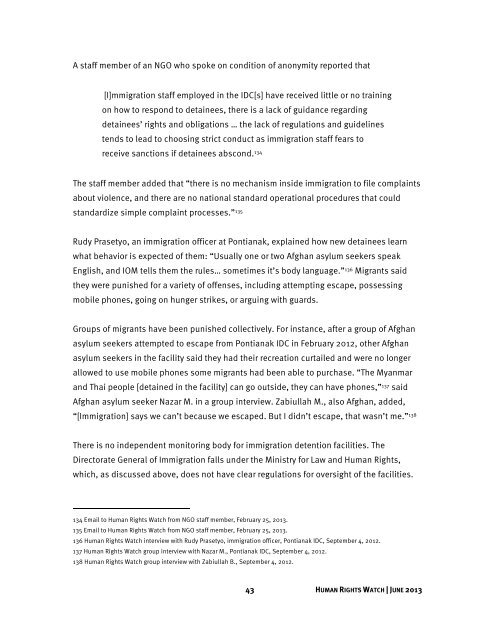Download the full report - Human Rights Watch
Download the full report - Human Rights Watch
Download the full report - Human Rights Watch
Create successful ePaper yourself
Turn your PDF publications into a flip-book with our unique Google optimized e-Paper software.
A staff member of an NGO who spoke on condition of anonymity <strong>report</strong>ed that<br />
[I]mmigration staff employed in <strong>the</strong> IDC[s] have received little or no training<br />
on how to respond to detainees, <strong>the</strong>re is a lack of guidance regarding<br />
detainees’ rights and obligations … <strong>the</strong> lack of regulations and guidelines<br />
tends to lead to choosing strict conduct as immigration staff fears to<br />
receive sanctions if detainees abscond. 134<br />
The staff member added that “<strong>the</strong>re is no mechanism inside immigration to file complaints<br />
about violence, and <strong>the</strong>re are no national standard operational procedures that could<br />
standardize simple complaint processes.” 135<br />
Rudy Prasetyo, an immigration officer at Pontianak, explained how new detainees learn<br />
what behavior is expected of <strong>the</strong>m: “Usually one or two Afghan asylum seekers speak<br />
English, and IOM tells <strong>the</strong>m <strong>the</strong> rules… sometimes it’s body language.” 136 Migrants said<br />
<strong>the</strong>y were punished for a variety of offenses, including attempting escape, possessing<br />
mobile phones, going on hunger strikes, or arguing with guards.<br />
Groups of migrants have been punished collectively. For instance, after a group of Afghan<br />
asylum seekers attempted to escape from Pontianak IDC in February 2012, o<strong>the</strong>r Afghan<br />
asylum seekers in <strong>the</strong> facility said <strong>the</strong>y had <strong>the</strong>ir recreation curtailed and were no longer<br />
allowed to use mobile phones some migrants had been able to purchase. “The Myanmar<br />
and Thai people [detained in <strong>the</strong> facility] can go outside, <strong>the</strong>y can have phones,” 137 said<br />
Afghan asylum seeker Nazar M. in a group interview. Zabiullah M., also Afghan, added,<br />
“[Immigration] says we can’t because we escaped. But I didn’t escape, that wasn’t me.” 138<br />
There is no independent monitoring body for immigration detention facilities. The<br />
Directorate General of Immigration falls under <strong>the</strong> Ministry for Law and <strong>Human</strong> <strong>Rights</strong>,<br />
which, as discussed above, does not have clear regulations for oversight of <strong>the</strong> facilities.<br />
134 Email to <strong>Human</strong> <strong>Rights</strong> <strong>Watch</strong> from NGO staff member, February 25, 2013.<br />
135 Email to <strong>Human</strong> <strong>Rights</strong> <strong>Watch</strong> from NGO staff member, February 25, 2013.<br />
136 <strong>Human</strong> <strong>Rights</strong> <strong>Watch</strong> interview with Rudy Prasetyo, immigration officer, Pontianak IDC, September 4, 2012.<br />
137 <strong>Human</strong> <strong>Rights</strong> <strong>Watch</strong> group interview with Nazar M., Pontianak IDC, September 4, 2012.<br />
138 <strong>Human</strong> <strong>Rights</strong> <strong>Watch</strong> group interview with Zabiullah B., September 4, 2012.<br />
43 HUMAN RIGHTS WATCH | JUNE 2013
















